Geneva, 13 May 2015 - The agreement was formalised in a Declaration of Intent that supports collaboration in the lead-up to the UNCCDCOP12 that will take place from 12-23 October 2015 in Ankara, Turkey.
The Declaration of Intent recognises the importance of creating public-private partnerships to work together on critical environmental issues. Strengthening public-private collaboration will increase understanding of the challenges around land degradation and help to scale up action.
WBCSD has established a work program on land restoration that will help companies participate in the UNCCD COP12 process.
What is land degradation?
Across the world, around 25% of usable land is degraded. This equates to approximately 2 billion hectares, or an area about the size of South America. Every year, an additional 12 million hectares - the equivalent of South Africa’s arable land surface - are subject to further degradation.
Land degradation leads to pest increase, scarcity of clean water and biodiversity loss. This results in food insecurity and makes the affected areas, their populations and business operations more vulnerable to climate change. As the global population continues to grow, so too does the risk that usable land may not be able to meet its demands.
It is essential that business and governments all over the world work together to halt and reverse land degradation, restore degraded ecosystems and manage our land resources sustainably.
There is a strong business case for action, as land is an essential asset for many companies. Degradation is an issue for sectors ranging from those facing a direct risk (such as agriculture and forestry), to those facing indirect risks via their supply or value chains (such as retail, mining, energy and insurance).
One common factor however, is that the risks and opportunities of land degradation are often underestimated by companies.
How does land degradation fit into the international agenda in 2015?
Land degradation is becoming an increasingly high-profile issue at the international level. During the UNCCD COP12, Parties of the Convention will consider the possibility of adopting Land Degradation Neutrality (LDN) as a global 2030 target.
LDN is also due to become one of the Sustainable Development Goals (SDG) that will be adopted during the UN General Assembly in New York in September.
The Bonn Challenge (2011) and the New York declaration on Forests (2014), which together aim to restore 350 million hectares of degraded land by 2020, are practical actions that support this Goal.
However, LDN can’t be achieved by governments alone. Business has a critical role to play and needs to be engaged at an early stage in the design of national plans towards LDN, in order to significantly contribute to the solution.
Quotes
Peter Bakker, President and CEO of the World Business Council for Sustainable Development (WBCSD) “Land degradation is a serious issue. Many of our member companies are already contributing to reducing the pace of land degradation by implementing sustainable land management or committing to deforestation-free targets within their supply chain. However, land degradation neutrality won’t be achieved without support from governments sending the right signals to business, whether through new incentives or policy frameworks. Working with the UNCCD and the Turkish government will help us initiate this public-private dialogue and collaboration, while ensuring we increase the positive impact from COP12 this October.”
Monique Barbut, Executive Secretary of the UN Convention to Combat Desertification (UNCCD) “This year is a critical one for the UNCCD, with the adoption of Land Degradation Neutrality (LDN) by the UNCCD parties. We are working hard to translate LDN into an actionable plan for governments. However, LDN can only be achieved through an inclusive process that engages with all stakeholders that impact or depend upon land. Business is definitely part of the solution, and we are working closely with the WBCSD to ensure the most relevant and effective business participation in the COP.”
Ismail Belen, Turkish Ministry of Forests and Water Affairs (MoFWA) “We are proud to host the COP and contribute to the adoption of a global Land Degradation Neutrality (LDN) target. We strongly believe in public private collaboration and will facilitate constructive dialogues during the COP. We are in fact hosting COP12 at a significant moment in international cooperation. The outcomes of COP12 are expected to advance the international path being charted to eradicate poverty, under the SDGs, and they are also expected to advance progress in the 2015 Paris Climate Change Conference (COP21) by ensuring land use practices contribute to climate change mitigation and adaptation.”








